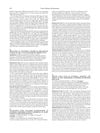 4 citations,
November 2014
4 citations,
November 2014 The skin protects the body, regulates temperature, senses touch, and makes vitamin D.
 September 2014 in “Journal der Deutschen Dermatologischen Gesellschaft”
September 2014 in “Journal der Deutschen Dermatologischen Gesellschaft” Diabetes can cause a variety of skin disorders, some of which may signal more serious health issues.
181 citations,
December 2017 in “Trends in immunology” Intestinal intraepithelial lymphocytes are crucial for gut immunity and maintaining the mucosal barrier.
 27 citations,
December 2016 in “Dermatology and Therapy”
27 citations,
December 2016 in “Dermatology and Therapy” Certain skin conditions can indicate insulin resistance and should prompt lifestyle changes and medical treatment to manage underlying health issues.
 2 citations,
February 2017 in “International Journal of Molecular Sciences”
2 citations,
February 2017 in “International Journal of Molecular Sciences” Erdr1 could be a new marker for diagnosing hair loss.
 November 2024 in “Medicina”
November 2024 in “Medicina” Recognizing scalp symptoms in PRP is crucial for proper diagnosis and treatment.
 August 2022 in “Revista de la Universidad Industrial de Santander/Salud UIS”
August 2022 in “Revista de la Universidad Industrial de Santander/Salud UIS” Stress-related hair loss was reversed with a special medication.
 1 citations,
May 2021 in “International Journal Of Medical Science And Clinical Invention”
1 citations,
May 2021 in “International Journal Of Medical Science And Clinical Invention” Women with PCOS may have a higher risk of severe COVID-19 due to hormonal imbalances and vitamin D deficiency.
 13 citations,
February 2023 in “Aging”
13 citations,
February 2023 in “Aging” A substance from hair follicle stem cells helps heal skin wounds in diabetic mice by promoting cell growth and preventing cell death.
 8 citations,
August 2015 in “Journal of dermatological science”
8 citations,
August 2015 in “Journal of dermatological science” Rhododendrol in skin-whitening products can cause skin depigmentation and immune reactions.
 17 citations,
July 2018 in “International Journal of Cosmetic Science”
17 citations,
July 2018 in “International Journal of Cosmetic Science” Keratin-based particles safely improve hair strength, smoothness, and heat protection.
137 citations,
January 2006 in “Frontiers in bioscience” CRH in the skin acts like the body's stress response system, affecting cell behavior and immune activity.
 January 2018 in “Springer eBooks”
January 2018 in “Springer eBooks” PDE inhibitors, especially PDE4 inhibitors like apremilast, are effective for certain inflammatory skin conditions but have side effects and can be costly.
 5 citations,
December 2022 in “Toxins”
5 citations,
December 2022 in “Toxins” Neurotoxins can affect neurotransmitter release and have potential in treating muscle, pain, and cancer conditions, but more research is needed on how they work.
 8 citations,
July 2022 in “Biomedicines”
8 citations,
July 2022 in “Biomedicines” Autophagy helps keep skin healthy and may improve treatments for skin diseases.
 1533 citations,
October 2008 in “Endocrine reviews”
1533 citations,
October 2008 in “Endocrine reviews” Mice without the vitamin D receptor have bone issues and other health problems, suggesting vitamin D is important for preventing various diseases in humans.

COVID-19 can lead to different skin symptoms and might trigger autoimmune diseases in genetically susceptible people.
 6 citations,
December 2022 in “Frontiers in Pharmacology”
6 citations,
December 2022 in “Frontiers in Pharmacology” Quercetin may help improve symptoms of polycystic ovary syndrome.
 1 citations,
May 2019 in “Cytotherapy”
1 citations,
May 2019 in “Cytotherapy” The new ddPCR method reliably detects unwanted viruses in CAR-T cell products, ensuring their safety for patients.
 April 2015 in “Andrology”
April 2015 in “Andrology” HNG may help prevent the negative effects of chemotherapy on sperm production and white blood cell counts.
 1 citations,
May 2019 in “Cytotherapy”
1 citations,
May 2019 in “Cytotherapy” New Australian advertising rules improved stem cell marketing practices but further regulation is needed for consumer safety.
 May 2019 in “Cytotherapy”
May 2019 in “Cytotherapy” Patients in Australia underwent costly, unproven stem cell treatments due to weak regulations and aggressive marketing.
 January 2023 in “Discovery immunology”
January 2023 in “Discovery immunology” T cells and bacteria in the gut and skin help maintain health and protect against disease.

Innate lymphoid cells type 1 may contribute to alopecia areata by damaging hair follicles.
 9 citations,
January 2020 in “Critical Reviews in Immunology”
9 citations,
January 2020 in “Critical Reviews in Immunology” MAIT cells may help fight COVID-19 but also contribute to severe inflammation.
 106 citations,
July 2013 in “Advances in wound care”
106 citations,
July 2013 in “Advances in wound care” UV radiation can help sterilize wounds and promote healing but requires careful use to avoid damaging cells.
23 citations,
April 2021 in “International Journal of Dermatology” COVID-19 may trigger systemic lupus erythematosus, requiring careful diagnosis and treatment.
 October 2023 in “Frontiers in endocrinology”
October 2023 in “Frontiers in endocrinology” Effective PCOS treatments require targeting specific signaling pathways.
 9 citations,
July 2021 in “Essays in Biochemistry”
9 citations,
July 2021 in “Essays in Biochemistry” Sex hormones may influence COVID-19 severity, with males at higher risk, and certain hormone therapies could potentially treat the virus.
August 2024 in “International Journal of Molecular Sciences” Mesenchymal Stem Cell therapy shows promise for treating hair loss in Alopecia Areata.


























